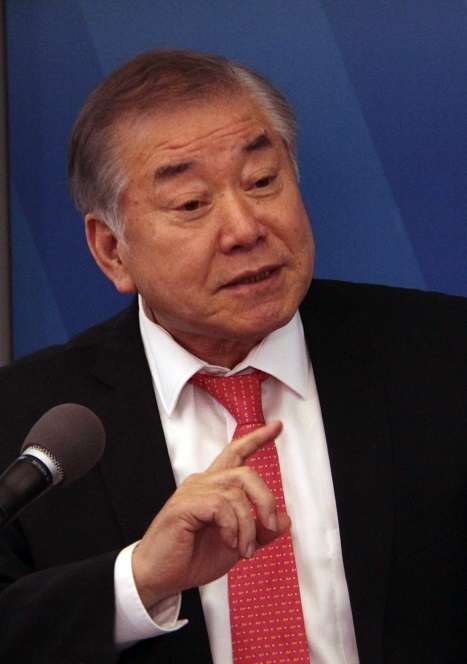With President Moon Jae-in and his US counterpart Donald Trump scheduled to hold their first summit at the end of this month, concerns are mounting over the allies’ contrasting views on how to resolve North Korea’s nuclear and missile threats.
Such worries intensified after Moon’s special adviser Moon Chung-in said on his trip to Washington on Saturday that South Korea would consult with the US on whether to scale back the scope of annual joint military drills and US deployment of strategic assets in exchange for “suspension” of the North’s nuclear and missile activities. The Trump administration has maintained that the North’s “complete removal” of its nuclear arsenal is a prerequisite to any dialogue.
 |
Moon Chung-in, President Moon Jae-in’s special adviser for unification, security and foreign affairs. (Yonhap) |
The envoy’s remarks sparked criticism that it would undermine the allies’ efforts to present a united front against the North, which has been facing international condemnation over its relentless ballistic missile tests and brutal treatment of a US prisoner.
“With the summit around the corner, the Moon Jae-in administration is pouring out a series of diplomatic remarks that could endanger the Korea-US alliance. If we begin talks unilaterally, what would happen to the international coalition (against the North?),” said Rep. Kim Young-woo of the opposition Bareun Party, who serves as chairman of the parliamentary defense committee.
“Talking about reduced combined exercise and the US deployment of strategic assets is nothing but succumbing to the North Korean pressure when the North has continued its provocations with nuclear and missile development.”
Washington also expressed skepticism about the envoy’s proposal. US State Department spokeswoman Alicia Edwards said that they view Moon Chung-in’s proposal as a personal view, not the official stance of the South Korean government, according to a report from VOA on Saturday.
The State Department also reiterated that the US would not begin dialogue with North Korea unless the regime abandons its nuclear weapon, asserting that there are no changes to the condition for bilateral talks with the North.
Some analysts suggested that if South Korea halted military drills in return for the North’s suspension of the nuclear and missile activities, Seoul would have little way of forcing the North to completely abandon its nuclear weapons.
“If we use suspension on military exercise and strategic deployment as a bargaining chip against the North, we don’t have any options to take during the denuclearization process,” said Ret. Army Gen. Shin Won-sik, former deputy chairman of Seoul’s Joint Chiefs of Staff, in a media interview.
North Korea has long demanded South Korea and the US suspend their joint military drills such as Key Resolve and Ulchi Freedom Guardian, describing them as an attempt to provoke a war on the peninsula. The allies insist the drills are defensive in nature.
Kim Hyun-wook, a professor at the Korea National Diplomatic Academy in Seoul, warned against adopting different tones with Washington amid public uproar over the regime’s brutal treatment of its citizen, Otto Warmbier, who was released in a coma last week after being imprisoned for “stealing” a propaganda poster from the country.
“I think South Korea and the US will eventually work out their differences over the North Korean issues. … (But) when we are dealing with an issue that could become an official agenda (during the summit), we have to work hard to avoid looking like we have different views,” said Kim.
Largely considered a part of “public diplomacy” ahead of the summit, the envoy’s proposal was seen as a further step in the plans of President Moon, who revealed Thursday that he could “pursue” talks if the North halted its nuclear and missile activities.
“The condition for inter-Korean talks doesn’t have to be necessarily the same as that for the talks between the US and North Korea.” Envoy Moon Chung-in told reporters who asked about the allies’ differences in the condition for dialogue with the North.
“How could we accept (the fact that there would be no talks) unless North Korea denuclearized. If North Korea stops provocations, we should talk with them. I don’t think there is a reason for the US to oppose the idea,” he said.
By Yeo Jun-suk (
jasonyeo@heraldcorp.com)








